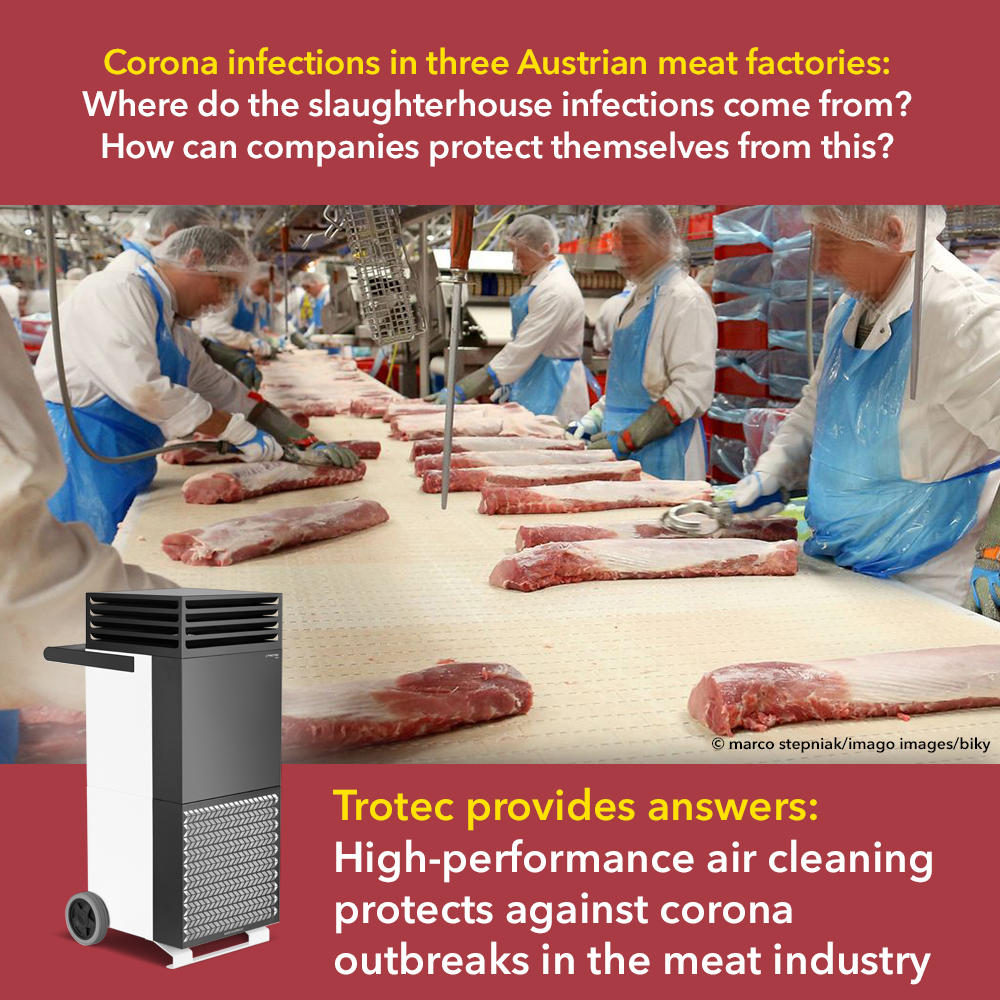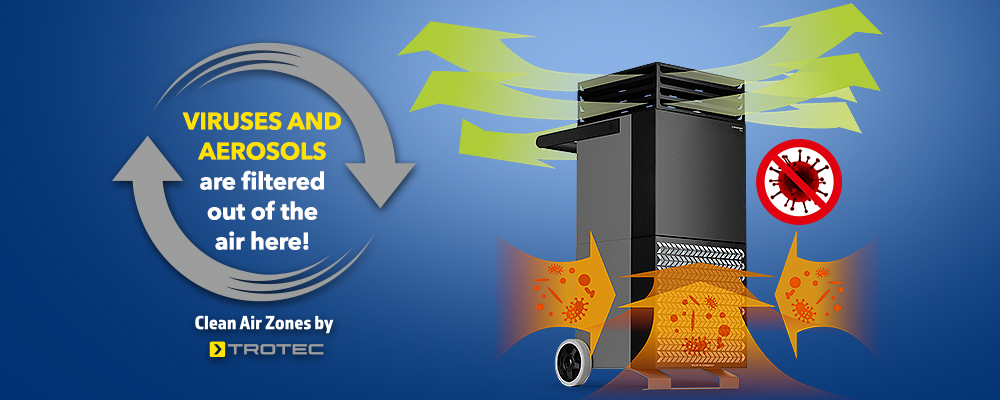 How can companies protect themselves against it? Trotec provides the answers: high-performance air purification protects against corona outbreaks in the meat industry
How can companies protect themselves against it? Trotec provides the answers: high-performance air purification protects against corona outbreaks in the meat industry
- Infectious aerosols in room air represent a risk factor which has so far been overlooked.
- High-performance air purifiers with H14 high-performance filters from Trotec can be used to provide immediate maximum protection against infection.
- The technology, developed in Heinsberg, is available immediately and can be adapted as a solution for the entire industry.
The meat industry is still in the line of fire! Employees tested positive for the coronavirus in three Austrian meat processing plants at the weekend. In addition to an abattoir in the district of Ried im Innkreis, which had a total of seven infected people (as of Monday, 6th July), there were also positive Covid-19 tests at a meat processing plant in the district of Wels-Land and at a meat processor in the district of Branau. Further test results are still pending, and the search for people who have been in contact with those affected is ongoing.
The meat industry keeps getting hit again and again
The Tönnies abattoir in Rheda-Wiedenbrück, now closed, caused a great stir in Germany. More than 1,500 employees tested positive for the coronavirus there, prompting the authorities to impose a renewed lockdown for the entire Gütersloh district. Immediately after Tönnies, meat producer Wiesenhof also reported cases in one of its operations, followed by doner producer Öztas from Moers, where more than 100 employees were also infected.
Previously overlooked risk factor in the meat industry: infectious aerosols
A working group in Germany consisting of employees from the State Centre for Health and the Robert Koch Institute is currently investigating why corona infection cases are increasing in meat processing companies and which technical solutions from Trotec should minimise the risk of infection in the meat industry as a whole. This investigation is led by Professor of Hygiene Martin Exner, Director of the Institute for Hygiene and Public Health at the University of Bonn.
What aerosol experts such as Dr. Thomas Voshaar (advisor to the German Federal Minister of Health Jens Spahn) have been warning against for quite some time, was once again underlined by the investigation into the corona outbreak in the Tönniesmeat plant in Gütersloh. Besides droplet and smear infection, the coronavirus primarily spreads via room air.
Infectious aerosols are inhaled unnoticed
More precisely through aerosols, a mixture comprising gas (usually air) and solid or liquid constituents, which contain viruses in infected persons. These tiny suspended particles are released into the room during breathing and talking. While larger droplets fall to the floor after approx. 1.5 metres owing to their weight (hence the social distancing rule of 1.5 m), infectious aerosol particles sometimes remain suspended due to their small size (approx. 0.3-0.4 µm) for several hours in the room air inside the meat cutting area cooled to 6 – 10°C, where they are permanently circulated around the room by the ventilation system – and continuously breathed in! “What is not known so far: Circulating air can keep an aerosol in motion, which is a previously overlooked risk factor,” said Prof. Exner in his analysis of the occurrence of infections at Tönnies.
This is due to the type of air conditioning customary in the industry. The room temperature in production areas is lowered and dehumidified, in order to keep the growth of microorganisms such as listeria and salmonella under control. However, very few companies have high-performance filtration, so infectious viruses spread throughout the entire production area. With the air purification technology developed by Trotec, this risk of infection should be reduced to almost zero in the future.
High-performance air purifiers from Trotec reduce the risk of infection
However, a mobile solution with a comparably high protection level has not been available so far for industry. “This is really important to me” – previous statutory regulations did not envisage high-performance filtration of the type that the TAC V+ air purifier can potentially offer to establishments in the meat industry. Therefore, according to Prof. Exner, the infections in the abattoirs aren’t a case of failures in prevention either, as there is still a lot to be learnt about the new pathogen.
Explanation of the operating principle of the air purifier TAC V+
A critical factor in the risk of infection with the coronavirus is how long the virus-laden aerosols remain in the room air. This is because – in contrast to the open air, where aerosol mixtures are diluted and replaced with fresh air by the air motion – the aerosol concentration remains continually high in closed rooms. The more aerosols are suspended in the air – and the longer they remain so – the faster they enter the body via the respiratory tract and cause an infection in the lungs. Around 50,000 particles, such as dust or pollen but also bacteria and viruses, are suspended in just one cubic centimetre of air. And with each additional person in the room, the aerosol concentration in the room increases by thousands of particles per minute.
Put simply, the TAC V+ air purifier brings the outdoor air conditions indoors and supplements this with highly efficient virus filtration and inactivation.
The air filtration concept behind the TAC V+ air purifier tested in clinical trials is based on two pillars:
- On the one hand, the aerosol concentration in the room air is continuously diluted with virus-filtered HEPA ultrapure air. To this end, the purifier has a high ultrapure air capacity – previously unattained with mobile devices – which enables an air exchange rate up to 20 times per hour.
- In addition, airborne viruses and bacteria are first separated in an innovative, heat-resistant HEPA particulate filter and then killed off cyclically by thermal decontamination. This special filter of protection class 14 exclusively developed by Trotec is distinguished by a separation efficiency of 99.995 percent for particle sizes from 0.1 to 0.2 µm. Thanks to these features, H14 high-performance filters are even used to produce clean air in operating theatres and in similar hygiene-sensitive areas.
What sounds very technical in theory proves to be really simple in practice. The draught-free intake of polluted room air occurs close to the floor, the ultrapure air free of viruses then being returned vertically upwards into the room. Thanks to the mobile design enabling several TAC V+ air purifiers to be used, even large areas of ultrapure air without hazardous aerosol contamination can be realised.

The TAC V+ mobile air purifier is available in several colours and equipment variants in the Trotec shop and Trotec branches around Europe.
Special conditions apply to schools, public institutions and hospitals when purchasing or renting the device. Please do not hesitate to contact us personally:

Trotec STORE
Grebbener Straße 7
52525 Heinsberg
Germany
Tel. +49 2452 962-400
E-Mail: store.heinsberg@trotec.com


